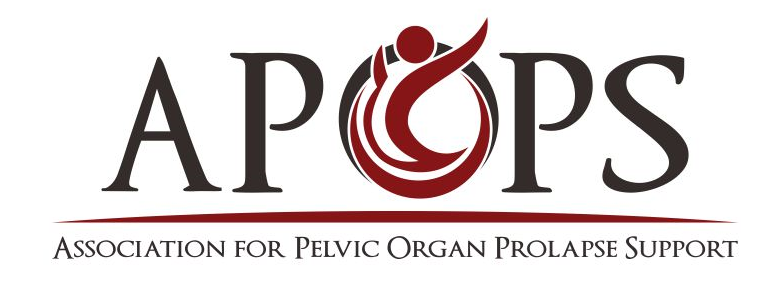MESH UPDATES
Women navigating pelvic organ prolapse have multiple treatment options and must decide whether or not to utilize non-surgical or surgical treatment. It is imperative women educate themselves about pelvic organ prolapse and all treatment options to better enable themselves to ask their clinicians the right questions, and make informed decisions. Check out the link below for Mesh Questions to Ask Your Clinician.
There are options regarding surgical procedures just as there are options whether or not to utilize surgical procedures at all. Use of mesh for pelvic organ prolapse surgery can reduce the risk of additional or repeat surgery down the road. For those who opt for surgical treatment, APOPS recommends seeking a subspecializing POP urogynecologist or urologist. Urogynecologists and urologists with an additional 2-3 years of fellowship training are the most logical surgeon choice for these intricate procedures.These surgeons specialize in women's pelvic health, pivotal for POP procedures just as an oncologist is for breast cancer or neurologist for multiple sclerosis (MS), reducing the risk of complications.
A dialogue will likely be initiated between patient and surgeon whether or not to utilize mesh if you choose surgical repair. Research your procedure choices between mesh and non-mesh, vaginal, robotic, laproscopic, or abdominal repair. It is a good idea to check the records of your individual physician as well to assure you have found the right physician for your specific needs. Ask all questions you have; a physician who will not take the time to address your concerns with this intricate procedure is not the physician of choice.
Mesh use is a personal preference POP subspecialists in the field make on a one-on-one basis based on patient individual needs and concerns. I am a woman whose surgical procedure was transvaginal mesh placement in February 2008 and remain very happy with the results of the procedure.However transvaginal mesh treatment is no longer an option in all countries, including the US. Mesh complications via vaginal insertion were addressed at the FDA in 2011, and again in 2019 related to issues in the UK, Australia, and New Zealand, countries which did not make adjustments to mesh procedure protocol at that time. At that point some countries discontinued insertion of mesh vaginally (as is the case in US). Check protocol in your indidual country to better understand best practice guidelines there.
Women who have concerns related to mesh procedures can request entry to and post questions in the APOPS Forum, a secure Facebook forum accessible only to women, urogynecologists, gynecologists, urologists, and women’s health physical therapists. Women with POP navigating treatment options, women post surgery both with mesh and without, women who prefer to utilize non-surgical treatment options, and multiple healthcare professionals share insights with each other in our protected environment.
Small incisions, proper mesh insertion location, preparation of mesh insertion site, use of estrogen cream pre and post-surgery, degree of mesh tension, and a two layer closure are important considerations for a quality mesh procedure, whether a surgeon performs mesh surgery through a transvaginal, robotic, or abdominal incision.
Articles by Sherrie Palm
FDA 2019 Transvaginal Mesh Meeting: Balancing the Rhetoric
Updates on Mesh Evolution, Feb 2019
POP Presentation to the FDA OB-GYN Committee 9/8/11
FDA Pelvic Organ Prolapse Mesh Report; The Rest of the Story
Mesh Questions to Ask Your Physician
60 Minute Mesh Expose: One-sided Noise Generates Fear on Mother's Day
POP Mesh Surgery: Tips for the Best Outcome 3/29/15
Every Woman Deserves the Right to Choose or Refuse Mesh April/16/2014
The video above was recorded in 2013. In February 2021, Sherrie reached the 13 year mark post transvaginal mesh repair for cystocele and rectocele without complications, and continues to feel she made the right choice to have transvaginal mesh to sustain the repair long term because without polypropylene mesh, POP surgery can fail in up to 30% of women. In April 2019 transvaginal use of mesh was disallowed in some countries including US, UK, Australia, Canada, Australia, New Zealand, and France. In most mainland European countries, Asia, and South America, they are still available as a surgical option for POP correction. Other types of mesh insertion are still approved globally. Every woman’s needs are unique. Every woman should do her homework and question her surgeon about mesh experience and practice.
As information and studies on long term efficacy of mesh become available, APOPS will post them on this page. As of April 2019, the FDA has disallowed use of transvaginal mesh prior to completion of studies ordered to validate the benefit/risk.
Pro/Con mesh info:
Vaginal Reconstructive Surgery: A Case For and Against Mesh Use
(EAU16) Do we still need meshes for correction of pelvic organ prolapse?
Joint Position Statement on the Management of Mesh-Related Complications for the FPMRS Specialist
Surgical Mesh for Transvaginal Repair of Pelvic Organ Prolapse in the Anterior Vaginal Compartment FDA Executive Summary, Feb 2019
Surgical Treatment of Female Stress Urinary Incontinence (SUI): AUA/SUFU Guideline
The Truth Behind Transvaginal Mesh Litigation: Devices, Timelines, and
Provider Characteristics
AUGS/SUFU Position Statement on Mesh Midurethral Slings for Stress Urinary Incontinence
Outside US:
(UK) RCOG July 2018 Mesh Update
IUGA update on mesh ban in 3 countries
(UK) RCOG and BSUG response to NHS Mesh report
(UK) RCOG Mesh Page
(UK) BAUS Mesh Complication Statement
TGA (Australia) actions after review into urogynaecological surgical mesh implants
IUGA commentary on the European Commission report regarding mesh
(Scotland) The clinical uses of mesh for stress urinary incontinence and pelvic organ prolapse
Litigation Concerns
As Pelvic Mesh Settlements Near $8 Billion, Women Question Lawyers’ Fees

